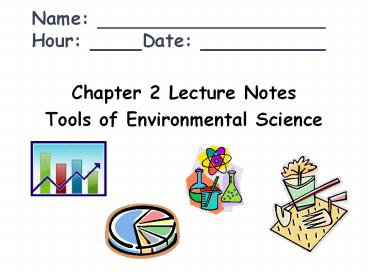Chapter 2 Lecture Notes - PowerPoint PPT Presentation
1 / 16
Title:
Chapter 2 Lecture Notes
Description:
Hour: Date: Chapter 2 Lecture Notes Tools of Environmental Science I can list and describe the steps of the scientific method. I can describe why a good hypothesis ... – PowerPoint PPT presentation
Number of Views:134
Avg rating:3.0/5.0
Title: Chapter 2 Lecture Notes
1
Name Hour Date
- Chapter 2 Lecture Notes
- Tools of Environmental Science
2
Section 1 Targets
- I can list and describe the steps of the
scientific method. - I can describe why a good hypothesis is not
simply a guess. - I can describe the two essential parts of a good
experiment. - I can describe how scientists study subjects in
which experiments are not possible. - I can explain the importance of curiosity and
open-mindedness in science.
3
The Scientific Method
- Scientific Method series of 5 steps scientists
use to identify and answer questions. - 1.
- Observation getting/using information by
- Observations can take many forms
- -Descriptions -Drawings
- -Photographs -Measurements
- Observations can be or
4
What are some Qualitative and Quantitative
Observations about the Following Photograph
- itative
- In the kitchen
- Golden retriever acting as a chef
- White hat/apron
- Blue oven mitt
- White stove/tile
- Brown cabinets
- TV in the corner
- titative
- 1 dog, stove, oven mitt, hat, apron
- Standing on 2 feet
5
2. Hypothesizing and Predicting
- Hypothesis explanation based on .
- not merely a guess, it is an prediction.
- must be .
- should be stated in format.
3. Experimenting
- Good experiments have 2 essential
characteristics - a single is tested
- a is used.
- Variable the factor that in an experiment to
test a hypothesis.
6
Experimenting
- To test for one variable, scientists study two
groups at one time, with a variable being the
between the two groups. - group exposed to the thing (variable) you
are testing - group used as a comparison.
- exactly the same as experimental group EXCEPT it
is not exposed to the variable.
7
4. Organizing and Analyzing Data
- Data information collected through or .
- Should be organized into or
- Data can be ITATIVE or TITATIVE
8
5. Drawing Conclusions
- Scientists determine results of their experiment
by data and the outcome of their
experiments with their prediction. - Repeating Experiments
- Scientists often experiments
- The more often an experiment can be repeated with
the results, in different places and by
different people, the more scientists become
about the reliability of their conclusions.
9
Characteristics of a Good Scientist
- OSCO
- O
- S
- C
- O
- United States
- Rivers Activity
10
Comprehension Check
- 1. How would a scientist categorize a testable
explanation for an observation? - A. a correlation
- B. an experiment
- C. an hypothesis
- D. a prediction
11
Comprehension Check
- 2. Why is being skeptical important to a good
scientific mind? - willingness to travel
- an empathetic nature
- desire to conduct experiments
- continually questioning observations
12
Comprehension Check
- 3. How many mussels are less than 25 mm in
length? - 6
- 9
- 12
- 15
13
Comprehension Check
- 4. Determine the total size of this population of
dwarf wedge mussels. - A. 60
- B. 80
- C. 100
- D. 120
14
Comprehension Check
- 5. What is the most likely size predictable for a
mussel randomly drawn from this population? - 1520 mm
- 2530 mm
- 3035 mm
- 4045 mm
15
Section 3 Target
- I can describe four values that people consider
when making decisions about the environment.
16
Values and the Environment
- Scientific is an essential first step in
solving environmental problems. - before research can begin, an is
usually needed. - Values principles or
- standards an individual
- considers to be
- and affect
- environmental decision
- making.































